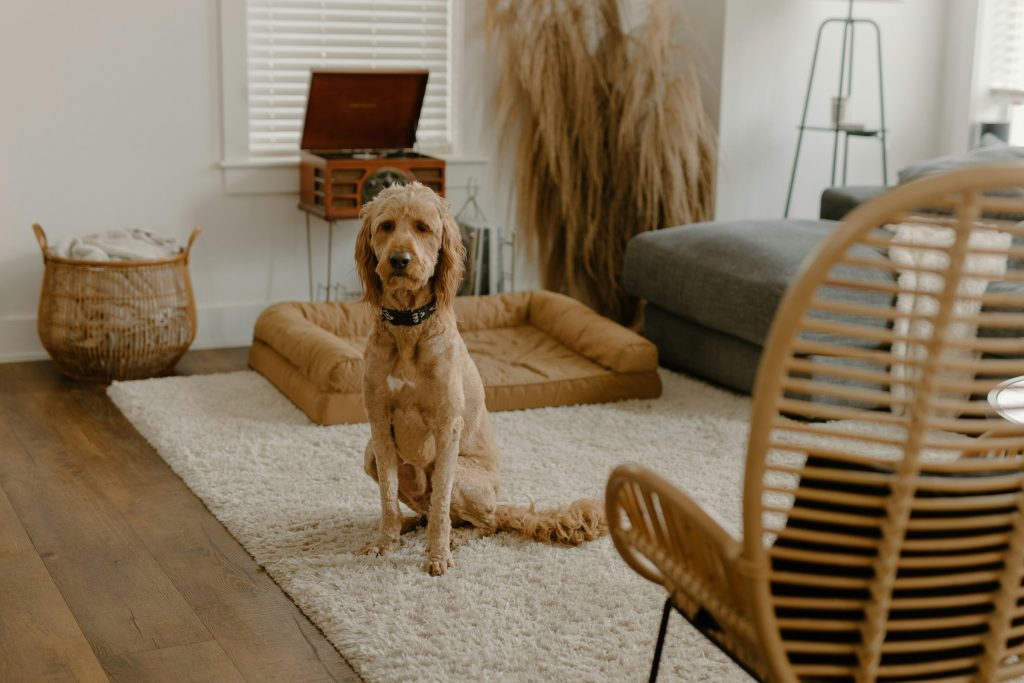
How to Stop Your Dog From Barking at Random Noises
If you’re trying to Stop Your Dog from Barking at every creak, footstep, or passing sound, you’re not alone. Random-noise barking is one of the most common (and frustrating) behavior issues for dog owners—especially in apartments or busy neighborhoods where sounds are unpredictable.
What makes this type of barking so challenging is that it often feels automatic. Your dog reacts before you can intervene, and over time the pattern becomes ingrained. The good news is that this behavior isn’t stubbornness—it’s a learned response that can be reshaped with the right approach.
This guide focuses on practical, humane strategies to help your dog stay calmer around everyday noises. You’ll learn why random sounds trigger barking, what unintentionally reinforces the behavior, and how to create a plan that actually works in real homes.
Whether your dog barks at footsteps in the hallway, doors closing, or distant street noise, the goal isn’t silence—it’s helping your dog feel safe enough that barking is no longer their default reaction.
Why Dogs Bark at Random Noises (And Why It Escalates)
Before you can reliably Stop Your Dog from Barking at random noises, it helps to understand what’s driving the reaction. Dogs don’t bark “for no reason.” Even when the trigger seems tiny to you, your dog is responding to something that feels important in their world.
Alert barking is a natural instinct
Many dogs are wired to notice changes in their environment and alert their people. A hallway footstep, a car door, or a neighbor’s voice can feel like a potential threat—or at least something worth investigating. In apartments, the constant background noise makes these “changes” happen more often.
Noise sensitivity can build over time
When a dog startles at a sound and barks, the barking itself can become part of the habit loop. Your dog hears a noise, their body goes into high alert, they bark, and then the sound usually stops (because it was temporary). From your dog’s perspective, barking “worked,” which makes them more likely to repeat it next time.
Stress and boredom make barking worse
Dogs who are under-stimulated or already stressed often have a lower threshold for reacting. In other words, when your dog’s “stress bucket” is full, even minor noises can push them over the edge. This is especially common when dogs spend long stretches indoors without enough enrichment or predictable downtime.
Owners accidentally reinforce it (without realizing)
Even well-meaning reactions can reinforce barking—like rushing over, speaking urgently, or repeatedly saying “quiet.” If your dog learns that barking reliably gets your attention (even negative attention), the behavior becomes more rewarding to repeat.
The ASPCA explains that barking has many causes—alerting, anxiety, boredom, and learned reinforcement—and that addressing the root cause is the most effective path forward: ASPCA: Barking (Causes and Solutions) .
Next, we’ll look at the most common mistakes that keep random-noise barking going—and what to do instead so you can make real progress.
What Most Owners Do That Makes Noise Barking Worse
When you’re trying to Stop Your Dog from Barking, it’s natural to react quickly in the moment. Unfortunately, some of the most common reactions accidentally teach dogs to bark more—not less. These habits are easy to fall into, especially when noise barking catches you off guard.
Responding with urgency or frustration
Moving quickly, raising your voice, or sounding upset can reinforce your dog’s belief that the noise was important. Your reaction confirms that something “big” just happened, which keeps your dog on high alert.
Repeating “quiet” without teaching an alternative
Saying “quiet” over and over doesn’t teach your dog what to do instead of barking. Without a clear alternative behavior—like settling on a mat or checking in with you—dogs default back to barking when the next sound appears.
Relying on punishment or startling tools
Tools designed to interrupt barking may stop the sound in the moment, but they often increase anxiety around noises. Over time, this can make barking worse or lead to other stress-related behaviors.
Ignoring your dog’s mental needs
A dog with excess mental energy has a much lower tolerance for random sounds. Enrichment doesn’t have to be complicated—simple indoor games and problem-solving activities can dramatically reduce noise sensitivity: 5 Indoor Games to Keep Your Dog Happy .
Avoiding these mistakes sets the stage for progress. In the next section, we’ll focus on practical strategies that actually help dogs stay calmer when random noises happen.
Practical Ways to Stop Your Dog From Barking at Random Noises
Once you understand the triggers and remove the common mistakes, it becomes much easier to Stop Your Dog from Barking at random sounds. The strategies below focus on changing your dog’s emotional response to noise—not just suppressing the bark.
Teach a calm “check-in” instead of reacting
Rather than telling your dog to be quiet, teach them what to do when they hear a noise. Start by rewarding your dog for calmly looking at you when a mild sound occurs. Over time, your dog learns that checking in with you—not barking—is the correct response.
Pair noises with something positive
This technique, often called desensitization, works by changing how your dog feels about sounds. When a noise happens, calmly deliver a treat or initiate a short, positive interaction. The goal is for noises to predict good things instead of stress.
Create a predictable “quiet zone”
Dogs are less reactive when they have a safe, consistent place to relax. This could be a bed, crate, or corner of the room where noise is naturally reduced. Structure and predictability help lower baseline stress, which makes barking less likely.
For many dogs, structured rest spaces work especially well when paired with gradual crate or confinement training: 15 Effective Tips for Crate Training Apartment Dogs .
Reduce overall arousal during the day
Dogs who are already overstimulated react more intensely to noise. Regular mental enrichment, predictable routines, and intentional downtime all lower arousal levels—making it easier to Stop Your Dog from Barking when unexpected sounds occur.
In the final section, we’ll tie everything together and answer the most common questions owners have about noise-related barking.
Final Thoughts
Learning how to Stop Your Dog from Barking at random noises isn’t about silencing your dog—it’s about helping them feel safe and confident in their environment. When barking is treated as communication rather than misbehavior, real progress becomes possible.
By understanding why noises trigger your dog, avoiding common mistakes, and teaching calm alternatives, you can reduce barking without increasing stress. Consistency matters more than perfection, and small changes made daily often lead to the biggest improvements.
If barking persists despite these strategies, it may be worth consulting a qualified trainer or behavior professional to tailor a plan specific to your dog’s needs.
Frequently Asked Questions
Why does my dog bark at noises I can barely hear?
Dogs have much more sensitive hearing than humans. Sounds that seem insignificant to you can feel loud or concerning to your dog, especially if they’re already alert or stressed.
Should I ignore my dog when they bark at noises?
Ignoring barking can work in some situations, but it’s usually more effective to teach an alternative behavior. Simply ignoring the barking doesn’t change how your dog feels about the noise.
Are anti-bark collars a good solution?
Anti-bark collars may stop barking temporarily, but they don’t address the underlying cause and can increase anxiety. Long-term improvement usually comes from behavior modification rather than suppression.
How long does it take to reduce noise barking?
Many owners notice improvement within a few weeks when they apply consistent strategies. Dogs with long-standing noise sensitivity may take longer and benefit from gradual, patient training.
When should I seek professional help for barking?
If barking is intense, frequent, or accompanied by signs of anxiety or fear, working with a qualified trainer or veterinary behaviorist can provide personalized guidance.

Join the Busy Pet Parent
Newsletter!
Get easy routines, time-saving tips, and the latest gear reviews—delivered straight to your inbox.
Perfect for busy pet owners, apartment dwellers, and anyone who wants a happy, healthy companion (without the stress).
- Exclusive guides & checklists
- Product recommendations & deals
- No spam—unsubscribe anytime!
More Articles You Might Like

17 Clever Ways to Master How to Train a Cat (Even in Apartments)
Read more

17 Gentle Ways to Master How to Teach Dog to Be Alone (Without Drama)
Read more

10 Affordable Pet-Friendly Apartment Upgrades That Make Life Easier
Read more

15 Quiet Dog Breeds for Apartments That Make Perfect Neighbors
Read more
